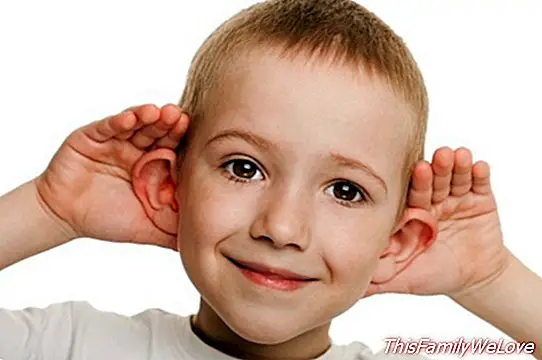Hearing in children, essential in language development

Babies and children learn many things by imitation and in the case of language development the same thing happensor. In order for a child to learn to speak, it is necessary for him to have a good hearing that allows him to discriminate the different sounds. With these games and activities you can stimulate your child's hearing so he can start talking.
The baby's auditory training is vital and begins with the discovery of "natural noises", that teach your child to appreciate different sound qualities. Therefore, if we consider oral language as the active element and hearing as the passive element, to get your child to learn to speak by pronouncing the words appropriately is fundamental a correct hearing that we can stimulate through games according to their age.
It is important to emphasize that hearing is more responsible for the development of language and learning of reading and writing than vision, since good auditory discrimination leads to a correct development of language.
Stimulation of hearing in children
In the first months:
- Encourage your child to find where the sound comes from with musical toys and then try to relate the noise to the movement.
- Talk to him from different places, whisper in his ear and sing him children's songs.
- Play a variety of music.
- Change the tone of voice.
- Show him books with great illustrations, naming the objects while pointing them out.
From 1 to 6 years old:
- Repeat songs or poems that rhyme, for example: "Sawdust, saw the timbers of San Juan ..."
- Invent words that rhyme: "How many words can you find that rhyme with the word cat?"
- Talk to him about the first sounds of familiar words, for example: "What sound do you hear at the beginning of your name?", "Do you know any other word that starts with the same sound?".
- Design a book with photographs of all the members of the family and look for images of objects that start with the same letter of each name
From 2 to 4 years old:
- Describe the actions performed by the protagonist of a story.
- Fill glass jars with different materials to appreciate the sonorous differences when moving them.
From 4 to 6 years old:
- Read stories with him and ask simple questions.
- Play to identify sounds produced by the body (clapping, jumps and others) and to name objects according to a given characteristic, for example: "Tell me something that is blue".
Fonoarticulatory exercises to practice with your baby
At home we can do exercises with the mouth with the child, also known as fonoarticulators. For example:
- Give many kisses, we force him to use the musculature of the lips.
- Fill air balloons so that it also uses the respiratory system.
- Play to stick out your tongue a lot, trying to touch your nose is good exercise for children with difficulty in pronouncing the "r". Move it to all sides.
- On the street imitate sounds, like for example, that imitates the sound of the motorcycle "run, run, run".
- To practice with the "g" tell him to put the little hand on his neck and make the sound of the "g"; Check how your neck moves, "gu, gu, gu".
In short, make games with the tongue, lips and face to stimulate all the muscles involved in speech.
Álvaro García
Advisor: Marisol Ramos. Clinical Psychologist and Speech therapist. Valdavia Medical Center
It may interest you:
-Test to detect good hearing of your baby
- Music in children improves hearing
- Hearing loss in children
- The audition of young people, endangered by bad practices




